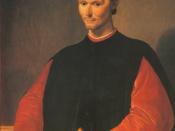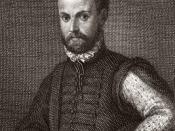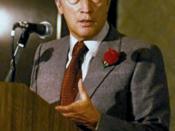Niccolo Machiavelli was a brilliant author during the Renaissance. He lived in Florence, Italy where he wrote a novel which would gibe leaders a guideline titled The Prince. The leader who will be compared to these principles is Pierre Trudeau in Montreal Canada during the October Crisis of 1970. During the October Crisis Trudeau demonstrated some Machiavellian leadership principles, which are very extreme. One Machiavellian principle used by Trudeau was the appearance of qualities. The end justifies the means is another perfect example of Machiavellian tactics used by Pierre Trudeau in October 1970.
One of Machiavelli's ideas that he developed was the appearance of qualities. In his novel The Prince he states "Don't remain faithful if it harms your interests." What he meant by this was that you should initiate the fox but disguise you character or that one must be able to adapt to the situation. This can be applied to the October Crisis by Trudeaus very calm attitude when he refused the Front Liberation Du Quebec's manifesto.
This showed that he could appear very faithful, in his saying he would publish it but didn't print the manifesto. Another quality that he shows was that he is merciful. An application of this is his bullying tactics. While he appeared to be merciful he suddenly implemented the War Measures Act which showed that even thought he appeared to be merciful he was not. When he implemented the WMA he was questioned and was quoted by saying "Watch me". Using other examples of him being a merciful and faithful nature this shows that if he needs to he will pull out all stops. Therefore Trudeau is able to disguise his character and act accordingly.
Furthermore, Machiavelli had more ideas that he developed, and perhaps an important one was the end justifies the means. In his novel The Prince he stated "the end justifies the means." What he meant by this was that if something goes wrong you must be prepared to do something equally as wrong and harsh in return. This can be applied to the October Crisis by the implementation of the War Measures Act. Trudeau implemented the WMA because he felt the FLQ had gone too far with the kidnapping of a Quebec Cabinet minister named Pierre Laporte. Laporte was later found murdered in the trunk of a car, which ironically was learned to be in retaliation to the implementation of the WMA. Another reason for him implementing the WMA was that he was strongly against Quebec separatist views and this in part entitled the FLQ. Another example of this would be by the federal government's negligence in not publishing the manifesto given to them by the FLQ. This further caused uproar and motivated the FLQ to take further measures. Therefore, when Trudeau felt enough was enough he took measures that he felt were necessary in hand.
Thus, during the October Crisis Pierre Trudeau demonstrated some Machiavellian leadership principles, which are very extreme. A principle used was the appearance of qualities, in that he acted faithful and merciful, but pulled out all stops and was the exact opposite. Another principle used was the end justifies the means, he followed this by doing something equally as harsh every time the FLQ had committed another act of terrorism in Quebec.





